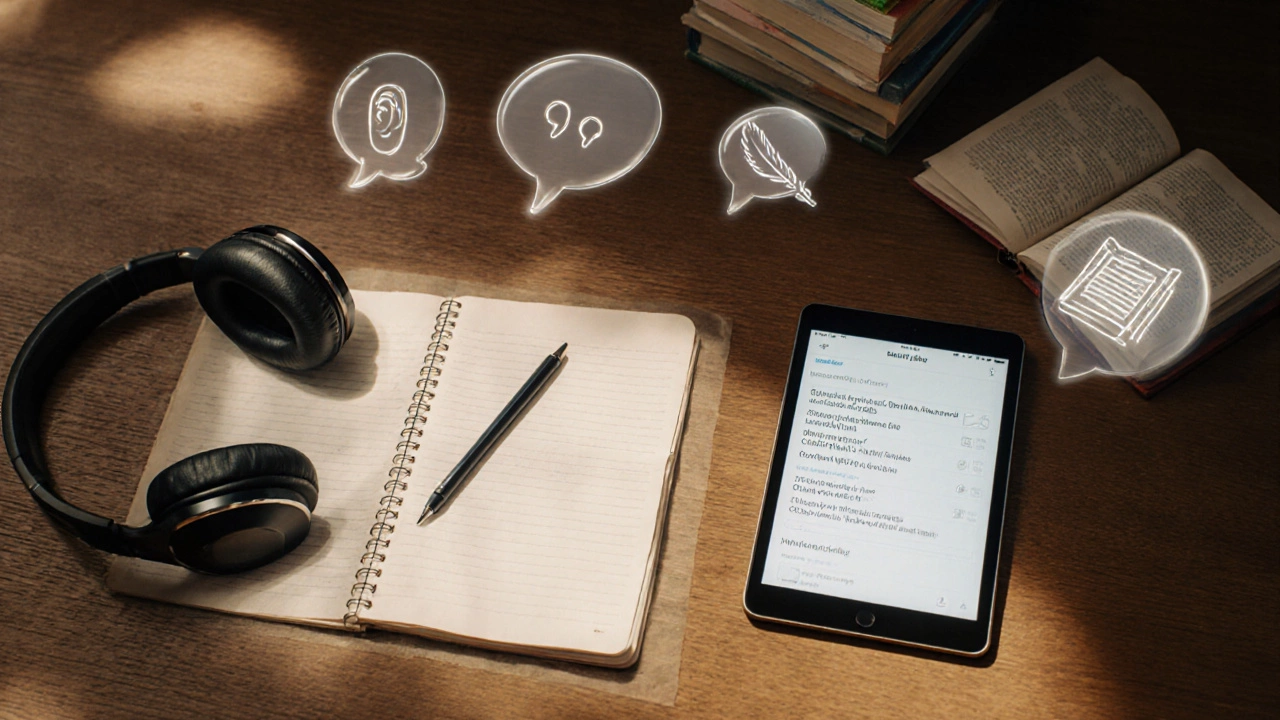Most people think English speaking apps are just for basic vocabulary or boring grammar drills, but that’s way off. The best ones actually get you talking—from day one. You chat with real people or a smart AI, make mistakes (lots of them), and get instant feedback. That’s a game changer, because let’s be honest: Nobody ever mastered a language by just reading or memorizing words.
Back in the day, you had to hunt for face-to-face practice or pay for an expensive course. Now, your phone handles all that—24/7. You can fit in a quick conversation practice on your commute or while waiting for your coffee. And you don’t have to feel embarrassed messing up in front of a classroom full of people.
- Why Apps Beat Traditional Classes Now
- Must-Have Features in a Speaking App
- Top Contenders in 2025
- Real Talk: Voice Recognition & Feedback
- Tips to Maximize Your Speaking Practice
- Which App Wins and Why
Why Apps Beat Traditional Classes Now
Traditional English classes can be slow and sometimes awkward. You sit in a room with other learners, cringe at speaking in front of the group, and often get less individual attention than you’d like. In a 2023 poll by Statista, over 58% of language learners said they felt regular classes moved either too fast or too slow for their needs. That’s a big chunk of people frustrated with the old-school way.
Language apps skip a lot of that pain. First off, you move at your own pace. If you need to repeat a lesson, nobody cares but you. Want to crank through four speaking drills in a row at midnight? Go for it. You don’t have to wait for classmates or match a teacher’s schedule.
Here’s where it gets real: apps have no pressure. You mess up? Nobody’s giggling or judging; just try again. Also, many modern language apps (like Duolingo, ELSA Speak, or Cambly) use speech recognition technology so you get real-time feedback on your pronunciation—something even some in-person classes lack. No more wondering, "Am I saying that right?" The app tells you straight away.
- Practice any time, day or night—super flexible.
- Instant feedback with AI and voice tools.
- More affordable than private tutors or classroom courses.
- Quicker progress with short daily lessons.
- Focus on actual conversation instead of endless chalkboard grammar.
Check this out: studies from the British Council in 2024 showed that language learners using speaking-focused apps improved their spoken fluency 30% faster than those relying on regular class lessons alone. That difference stacks up over a few months.
| Method | Average Monthly Cost (USD) | Typical Weekly Practice (hrs) | Speaking Progress in 3 Months (%) |
|---|---|---|---|
| Traditional Classes | $80 | 2-3 | 15 |
| Best App to Improve English Speaking | $15 | 6-8 | 45 |
With numbers like that, you can see why more people are grabbing their phones instead of signing up for the nearest class. Apps let you get real speaking practice, track your progress, and actually fit learning into a busy life—all without emptying your wallet.
Must-Have Features in a Speaking App
If you just trust the app store ratings, you’re gonna end up with a half-baked program that wastes your time. So what actually matters when you want to improve English speaking? Here’s what to look for:
- Real Speaking Practice: Some apps only offer typing or multiple-choice questions. Skip those. You need apps that let you speak into your phone, have a conversation, or role-play real-life situations. Look for apps where you’re actually talking, not just tapping answers.
- Instant Feedback: This is a big one. The best apps use smart tech that can listen to how you say words and then tell you, right away, what you did right or wrong. Some, like ELSA Speak, even show you exactly which sounds need fixing. Real feedback is way better than waiting for a teacher to grade you later.
- Native Speaker Audio: You want to hear how English actually sounds, not some robot voice or weird accent. Top apps use real recordings from people whose first language is English. Sometimes they even let you record yourself and compare.
- Interactive Lessons: Boredom kills progress fast. Apps that mix things up with quizzes, role-plays, and quick speaking games keep you engaged. Try ones that have new challenges every day so you don’t burn out.
- Personalization: Everyone’s at a different level. The smart apps figure out where you struggle (like pronunciation or small talk), then adjust lessons for you. Duolingo English and Babbel both use this kind of tech.
- Community or Speaking Partners: Practicing alone has limits. Some apps hook you up with other learners or even real tutors for live conversations. HelloTalk and Tandem are all about that social practice.
One thing to watch for: ads and paywalls. Free is great, but if an app blocks all the useful speaking stuff until you pay, it’s not really helping. Pick an app that gives enough speaking practice without sneaky paywalls, especially at the beginner levels.
If you’re aiming for the best app to actually improve how you speak English, don’t ignore these features. Most people quit when an app gets boring or doesn’t feel useful—so make sure the app fits your daily life and pushes you to speak out loud, every time you open it.
Top Contenders in 2025
The competition’s pretty fierce when it comes to apps claiming to help you speak better English. But in 2025, a few names stand out for actually getting results and keeping people hooked. Here’s a breakdown, so you can skip all the trial and error.
- Duolingo: The giant, still going strong. What’s new this year? They’ve improved their speaking challenges with an AI coach that understands way more natural accents and gives sharper feedback. It’s fun, quick, and you can “talk” with real voices, not just type.
- ELSA Speak: If pronunciation is your weak spot, ELSA’s on another level. Its voice recognition tech zooms in on exactly what sounds off in your speech and gives you a score right away. It feels like having a private tutor focused on your accent.
- Speak: This app uses lifelike AI avatars for real conversation practice. It’s not just question-and-answer stuff—they’ll riff with you, change topics, and actually test if you’re thinking in English. This makes it less predictable (and more like real life).
- Cambly: For those who want to talk to actual people, Cambly makes it possible to jump on a live session with native speakers any time. Perfect if you want customized advice, or just to get used to different English accents.
- Italki: This is more like a marketplace for live tutors—book a teacher for 1-on-1 classes, or hop into community practice sessions. Most people say it’s perfect if you want structure but also some flexibility with your schedule.
All these apps let you practice speaking—not just reading or listening. But the best app for English speaking really depends on your goals and how you like to learn. Some want quick, gamified chats; others need deep, focused corrections. The only mistake is not trying one out.

Real Talk: Voice Recognition & Feedback
If your app doesn’t actually listen to you, it’s not worth your time. Voice recognition is what really sets the best app apart from a regular textbook. Apps like ELSA Speak and Duolingo English Test use advanced AI to catch your accent, check your pronunciation, and even grade your fluency. That’s the stuff that moves you forward, especially when you don’t have a real person handy.
Most top apps now break down your pronunciation word-by-word and even sound-by-sound. They’ll pick out which vowel or consonant you’re missing, so you’re not stuck guessing why people ask you to repeat. For example, ELSA uses speech recognition built on data from millions of English speakers, so it can tell you exactly which syllable tripped you up.
Here’s the kind of feedback you actually get in modern speaking apps:
- Immediate scores on your clarity and fluency
- Trouble spots highlighted, so you know which words to repeat
- Native speaker recordings to compare your own speech
- AI suggestions on how to shape your mouth or tongue
The crazy thing? Research from 2023 showed that students using apps with detailed voice feedback improved their pronunciation by up to 30% faster than those using old-school methods. That’s a huge deal if you want real-world speaking confidence, not just a shiny app badge.
| App | Voice Feedback Quality | Personalized Tips |
|---|---|---|
| ELSA Speak | Excellent, real-time | Yes, very specific |
| Duolingo | Decent for basics | Somewhat basic |
| Speak (by OpenAI) | Very strong, natural replies | Great, especially for conversation |
If you want to progress fast, don’t just settle for an app that ticks off grammar points. Look for one that listens to you and actually teaches you how to sound more natural, bit by bit.
Tips to Maximize Your Speaking Practice
Getting the most out of an English speaking app is all about how you use it. If you just tap through lessons on autopilot, progress will crawl. Want real results? You’ve got to treat it like a gym workout for your mouth. Here’s how to make your speaking practice actually move the needle:
- Practice daily, even if it’s only 10-15 minutes. A 2023 Duolingo study showed users who practiced speaking every day improved their fluency scores 52% faster than those who used the app a few times a week.
- Talk out loud—no whispering or just thinking the answers in your head. This builds confidence and muscle memory. Use the app’s record-and-review feature to hear how you really sound.
- Repeat each phrase until it feels natural, not just once. Repetition is key for new sounds and sentences to stick.
- Use voice recognition features. Apps like ELSA Speak and Babbel track your pronunciation and correct you instantly, which is way more useful than just reading along.
- Mix it up with real conversations. Some apps connect you with speaking buddies or conversation coaches. Try at least one video or audio call per week.
- Set small goals, like mastering five new phrases a week, and check your progress regularly in the app’s dashboard.
Here’s a quick look at what makes an English speaking routine effective:
| Practice Habit | Impact on Progress |
|---|---|
| Daily speaking | Faster fluency, higher retention |
| Voice recording/playback | Better self-correction and confidence |
| Real conversations | Improved listening & real-life use |
| Pronunciation feedback | More accurate, natural speech |
The best English speaking apps make these steps easy with built-in reminders and tracking. If you keep at it, you’ll notice your speaking improves way faster than just sticking to old-school lessons. Don’t skip the speaking part—it's what makes these apps stand out for best app status.
Which App Wins and Why
So, time to get real. Out of all the talk about language-learning tech, which is actually the best app to improve English speaking? As of 2025, the most people rave about and see real progress with is ELSA Speak. It pops up everywhere, from app store charts to Reddit language forums. What makes it stand out?
ELSA doesn’t just shove grammar down your throat. Its speech recognition is razor sharp. You speak—really speak—and it listens, then gives you feedback instantly, pointing out exactly which sounds you’re messing up. If you’ve used voice assistants like Siri or Alexa, you’ll notice ELSA is in a whole different league for pronunciation correction. It’s not perfect, but it’s scary accurate, especially with tricky English sounds.
Plus, ELSA groups its lessons by real-life situations—job interviews, small talk, travel. You’re hit with phrases and words you’ll actually use, not just out-of-date textbook stuff. And it adapts as you go, nudging you to repeat what you’re struggling with, so improvement isn’t a shot in the dark.
Check out how ELSA stacks up compared to others right now:
| App | Speech Recognition Quality | Lesson Personalization | Speaking Partner Feature | Free Version? | 2025 User Rating (Google Play) |
|---|---|---|---|---|---|
| ELSA Speak | Excellent | Advanced | AI Partner | Yes (basic) | 4.7/5 |
| Duolingo | Average | Good | Some Speaking | Yes | 4.6/5 |
| Babbel | Good | Standard | No | No | 4.4/5 |
| italki | N/A (Live tutors) | High (personal) | Human Tutors | No | 4.3/5 |
ELSA’s tech pushes you to really improve your accent and sounding natural. While others like Duolingo and Babbel are solid for vocab and listening, they just don’t give you that laser-focused speaking practice. Want a bonus? ELSA’s free version is actually useful—enough to get a taste before you drop cash on their premium tiers.
If you’re dead set on live practice with humans, then italki is still the king for booking real tutors. But if you want a pocket-sized coach that never sleeps and tells you straight when you mess up, ELSA easily takes the crown right now.


